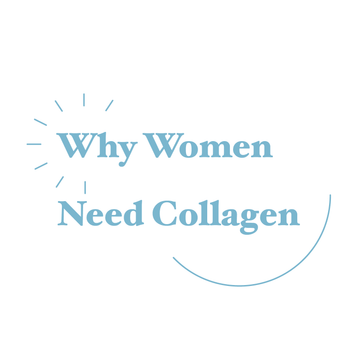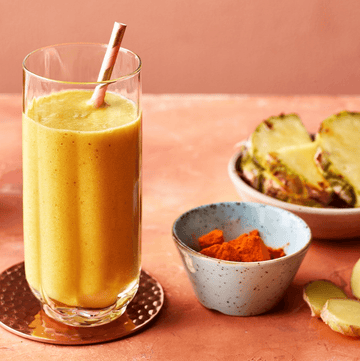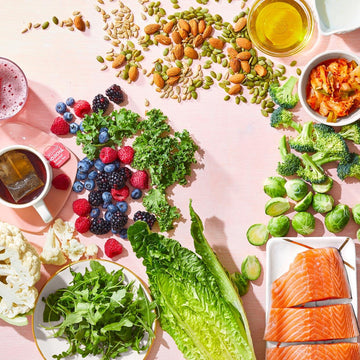
The female body is so amazing and complex. As a woman and a nutritionist, I am aware of how often my nutritional needs do and will change during different periods of my life. Menstruation, pregnancy, breastfeeding, and menopause are all reasons nutrient demands fluctuate and so, as women, we need to be extra mindful about what we are eating. One nutrient that can be beneficial to a woman, especially during and after pregnancy, is collagen. This is why I think women need collagen.
Why Women Need Protein
First, let’s talk about protein. Protein is one of the most important nutrients in our bodies. It is found in the muscles, bones, hair, skin, organs and contributes to almost all the body’s chemical reactions and processes including growth, development, and repair. In Canada, maintaining adequate amounts of protein is not too difficult, as protein-rich foods are abundant and readily available throughout our day. It is recommended that women should consume 0.8g of protein per kilogram of body weight each day. To put that in perspective, if I am a 125lb woman, I would need around 45g of protein each day. But during pregnancy and breastfeeding this recommendation is increased by about 25g to help meet the nutritional needs of the baby. So the 45g quickly becomes 70g which can be a bit overwhelming at first and during this time, a lot of women find it difficult to meet these recommendations. On top of that, it is common for pregnant women to experience food aversions, decreased energy levels and lack of time to plan out a diet that meets their new nutritional requirements. A great solution to this is to add a collagen supplement to your daily routine.
The Link Between Protein and Collagen
Collagen is a protein. In fact, it is the most abundant structural protein found throughout our connective tissues and especially in our hair and skin. Because collagen is a protein, it is broken down into amino acids just like other types of protein and so eating collagen is a great way to boost your protein intake and it has some other pretty awesome benefits as well! (Learn more about Collagen)
Collagen for Pregnancy and Postpartum
Most people familiar with collagen supplementation are aware of the amazing beauty benefits that it provides. But for pregnant women or during postpartum, collagen can be particularly useful for some of those unwanted changes that women often experience.
Here are some ways collagen can be helpful during pregnancy and postpartum:
- Skin - When pregnant, the skin is growing, stretching and expanding, especially over your belly, breasts, and booty. Applying creams and oils may work to a certain extent but do not completely diminish stretch marks. Collagen doesn’t just help with facial wrinkles and fine lines but can help your skin all over the body as it provides hydration, improves skin elasticity and promotes smoothness from the inside out, not just the outside in.
- Joints and Bones - Let’s face it, growing a baby inside of you puts a lot of pressure on your joints and bones! By the third trimester, many women struggle to move with the same amount of ease that’s typically normal for them. Sore joints, backaches, foot, and leg cramps are all too common. Collagen can relieve joint pain by helping maintain the integrity of your cartilage, which surrounds your joints and can keep your bones strong.
- Hair - Unfortunately, postpartum hair loss affects some women due to the rapid change in hormone levels. Although it is only temporary, it can be quite traumatic, especially when coupled with the already massive life change of having a baby. Collagen may help lessen the amount of hair loss as it works similarly with hair as with the skin. It strengthens, moisturizes and may help keep your hair full and glowing.
- Sleep - During the third trimester of pregnancy and especially when you're a new mom, it is difficult to reach the recommended 8 hours of sleep each night. Glycine, the main amino acid in collagen, may improve sleep quality through its calming effect on the brain.
- Recovery - Recovering from post-birth, whether its vaginal or c-section, is so important and requires optimal nutrition for tissue healing and prevention of infection. Ideally, your body will get lots of fluid, vitamin A and C, and high-quality protein. Collagen can be consumed to make sure you're getting all of the amino acids that are required for a speedy and full recovery.
Different time periods in our lives require different nutrient demands. Collagen can be a great addition to your everyday diet, especially during and after pregnancy.
Kirstin Berrington is an AURA Team member with a passion for all things nutrition and health. As a nutritionist, she is equipped with a B.Sc. in Human Nutritional Sciences to help answer all your food-related questions.






